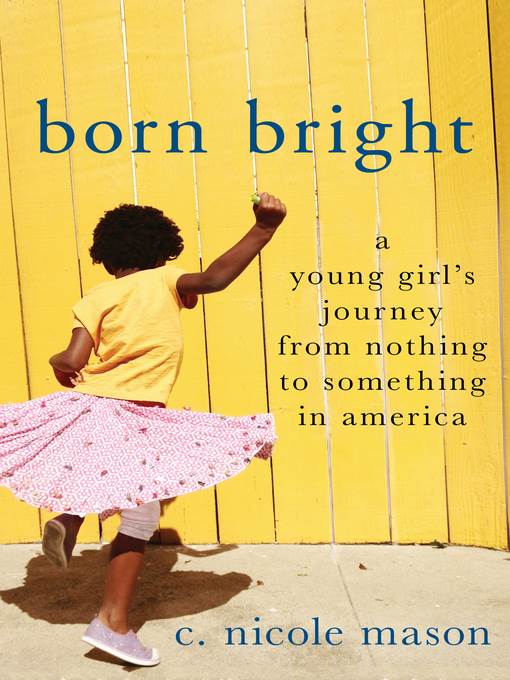
Born Bright
A Young Girl's Journey from Nothing to Something in America
کتاب های مرتبط
- اطلاعات
- نقد و بررسی
- دیدگاه کاربران
نقد و بررسی

June 13, 2016
Mason, executive director of the Center for Research and Policy in the Public Interest, a Manhattan-based women’s foundation, approaches the topic of poverty in America from an insider’s perspective. In this raw and intimate memoir, Mason takes readers from her childhood in California to her acceptance at Howard University, chronicling her struggle to break through the boundaries and limitations of growing up poor. Born in 1976 to an unmarried teenage mother, Mason loved learning, and school became her anchor in a volatile, violent, and ever-changing world. The family often moved from place to place, her young mother’s marriage to a drug dealer bringing even more danger and disruption into their lives. As the author entered her teens and felt the dire need to escape her mother’s abusive partner, she was welcomed by her grandmother in Las Vegas. Her circuitous course reveals the ongoing challenges involved in confronting the barriers of poverty and the pervasive risks of drugs, teen pregnancy, abuse, gangs, and racism. Along the way, Mason discusses the malfunctions of the criminal, legal, social services, and education systems, offering the alternative solution of a new, tiered system of family support. Mason vividly illustrates the grit, determination, and “herculean effort” necessary to reframe a young life steeped in unyielding poverty.

July 1, 2016
The aspirational story of a young African-American woman's rise from poverty."I considered myself fortunate, but in no way exceptional." So, toward the end of her memoir, writes Center for Research and Policy in the Public Interest executive director Mason of finding herself safely in academia and away from the fraught streets of the inner city. Getting there, she remarks, was a "herculean" matter of working past a host of obstacles--including, she suggests, the whole welfare establishment--that have been set up as if to make sure that children like her do not leave the ghetto for better lives. She levels the charge with such reasonableness that it seems unobjectionable, but of course, her memoir reveals her to be exceptional indeed. Even so, being exceptional, it seems, is not enough: in our Horatio Alger-like conception of wealth and poverty, we imagine that hard work, ambition, and perseverance will see us through and that poor people are that way by choice. Mason puts the lie to such notions, though she also provides ammunition for those who condemn generational welfare with her portrait of her mother, adept at working the system while making money on the side in the drug trade. (At the same time, her mother emerges as a good citizen of a kind, taking care of those even less fortunate.) A key for escape from poverty, by Mason's account, is education. More than that, there is the kind of social encouragement that her white peers seem to enjoy, with their "different way of being in the world, entitled and less fearful." Though without that cloying sense of entitlement, Mason's memoir also proves the power of assertive networking, for once she figured out that others were in positions to help her, she wasn't shy of asking. A thoughtful, well-crafted rejoinder to Claude Brown's half-century-old Manchild in the Promised Land, speaking to the power of hope and the institutional changes needed to make hope possible.
COPYRIGHT(2016) Kirkus Reviews, ALL RIGHTS RESERVED.

November 1, 2015
Writer and academic Mason details the nearly impossible story of her escape from poverty in an effort to demonstrate just how difficult, personally but especially structurally, that journey is for the poor.
Copyright 2015 Library Journal, LLC Used with permission.

August 1, 2016
Born to teenage parents in Los Angeles, Mason spent the 1970s and 1980s in poor, segregated neighborhoods. Her mother eventually married a drug dealer, which offered more stability than the family had ever experienced before; and while they lived better than most of their peers, Mason always knew she'd need to escapeboth from her stepfather's abuse and from worrying about her younger brother. Moving from school to school was a constant, but her love of learning was not dampened by the constant flux or the upheavals in her home life I needed an anchor, something to keep me from drifting away. And school was it for me. Despite mostly disinterested teachers and unmotivated classmates, Mason found a way to succeedby joining every club and activity that would take her, enrolling in honors classes without permission, and pestering a former guidance counselor to help her secure a spot at Howard University. Readers will find Mason's absorbing memoirwhich would make an excellent book-club selectionto be an interesting take on the issue of entrenched poverty in the U.S.(Reprinted with permission of Booklist, copyright 2016, American Library Association.)

























دیدگاه کاربران